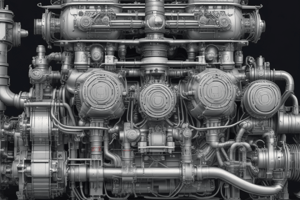Podcast
Questions and Answers
What defines an external combustion engine?
What defines an external combustion engine?
- It only operates using gas as fuel.
- It is primarily a type of diesel engine.
- It burns fuel internally to generate power.
- It generates energy outside of the engine by burning fuel. (correct)
Which of the following is a type of internal combustion engine?
Which of the following is a type of internal combustion engine?
- Steam Engine
- Spark Ignition Engine (correct)
- Turbine Engine
- Hydraulic Engine
What characterizes a compression ignition engine?
What characterizes a compression ignition engine?
- It uses a spark plug to ignite the fuel.
- It relies on heat generated from compressed air to ignite the fuel. (correct)
- It is a type of external combustion engine.
- It can only run on petrol.
Which fuel types are commonly associated with petrol engines?
Which fuel types are commonly associated with petrol engines?
What distinguishes a four-stroke engine from a two-stroke engine?
What distinguishes a four-stroke engine from a two-stroke engine?
Flashcards
Internal Combustion Engine
Internal Combustion Engine
An engine where fuel burns inside the engine cylinder to produce power.
External Combustion Engine
External Combustion Engine
An engine where fuel burns outside the engine cylinder to produce power.
Spark Ignition Engine (S.I. Engine)
Spark Ignition Engine (S.I. Engine)
A type of internal combustion engine that uses a spark to ignite the fuel-air mixture.
Compression Ignition Engine (C.I. Engine)
Compression Ignition Engine (C.I. Engine)
Signup and view all the flashcards
Two-Stroke Engine
Two-Stroke Engine
Signup and view all the flashcards
Study Notes
Engine Definition
- An engine is a machine that converts heat energy from fuel into mechanical energy through combustion, typically with a piston.
Types of Engines
- External Combustion Engines: Fuel burns outside the engine cylinder, for example, a steam engine.
- Internal Combustion Engines (I.C. Engines): Fuel burns inside the engine cylinder. These are further categorized as:
- Spark Ignition Engines (S.I. Engines): A mixture of air and petrol is ignited by a spark plug.
- Two-Stroke Engines: Complete cycle in two piston strokes.
- Four-Stroke Engines: Complete cycle in four piston strokes.
- Compression Ignition Engines (C.I. Engines): Compressed air ignites the fuel injected into the cylinder.
- Two-Stroke Engines: Complete cycle in two piston strokes.
- Four-Stroke Engines: Complete cycle in four piston strokes.
- Spark Ignition Engines (S.I. Engines): A mixture of air and petrol is ignited by a spark plug.
Four-Stroke S.I. Engine Working
- Suction Stroke: Piston moves from top dead centre (T.D.C.) to bottom dead centre (B.D.C.), creating a vacuum, drawing in the air-fuel mixture.
- Compression Stroke: Piston moves from B.D.C. to T.D.C., compressing the air-fuel mixture, increasing its temperature.
- Power Stroke: The compressed mixture is ignited by the spark plug, causing an expansion of gases that push the piston down.
- Exhaust Stroke: Piston moves from B.D.C. to T.D.C., pushing out the burnt gases.
Two-Stroke S.I. Engine Working
- Complete cycle occurs in two piston strokes, involving a transfer port for the mixture.
Four-Stroke C.I. Engine Working
- Suction Stroke: Piston moves from T.D.C. to B.D.C., drawing in air.
- Compression Stroke: Piston moves from B.D.C. to T.D.C., compressing the air, raising its temperature significantly (approx. 400°C - 600°C).
- Power Stroke: Diesel fuel is injected; the high temperature ignites the fuel directly. Pushing the piston generates power.
- Exhaust Stroke: Piston moves from B.D.C. to T.D.C., expelling the burnt gases.
Two-Stroke C.I. Engine Working
- Complete cycle occurs in two piston strokes, with fuel injection during the compression stroke. A transfer port transfers the compressed air/fuel mixture.
Studying That Suits You
Use AI to generate personalized quizzes and flashcards to suit your learning preferences.





